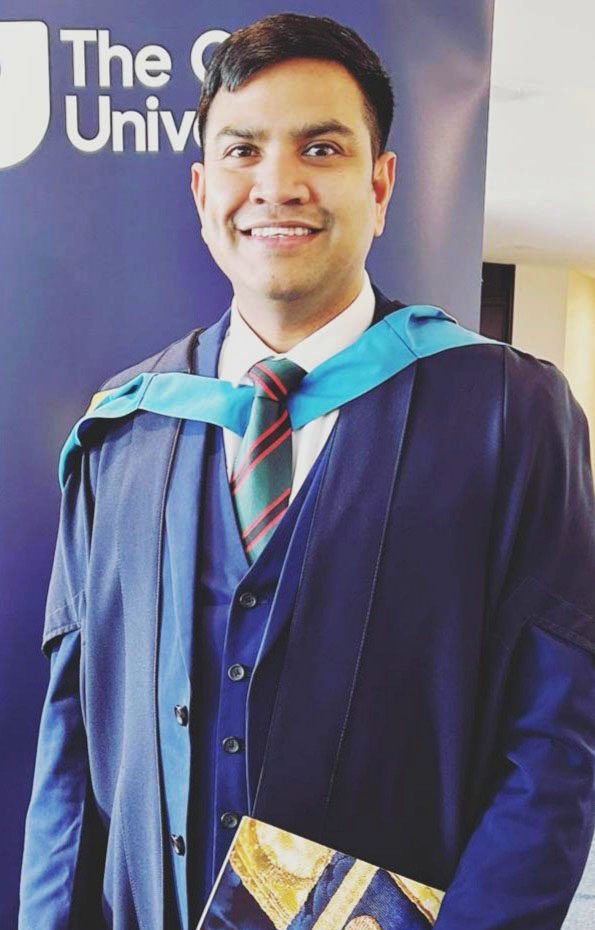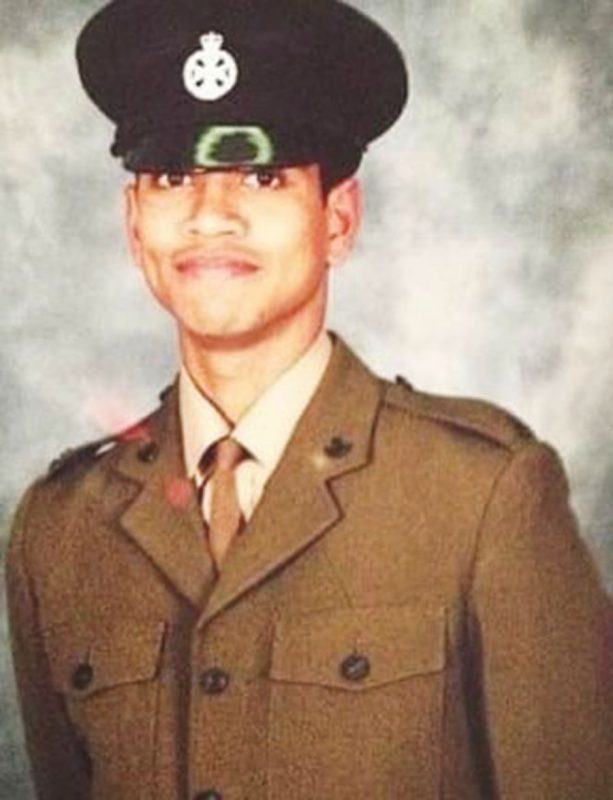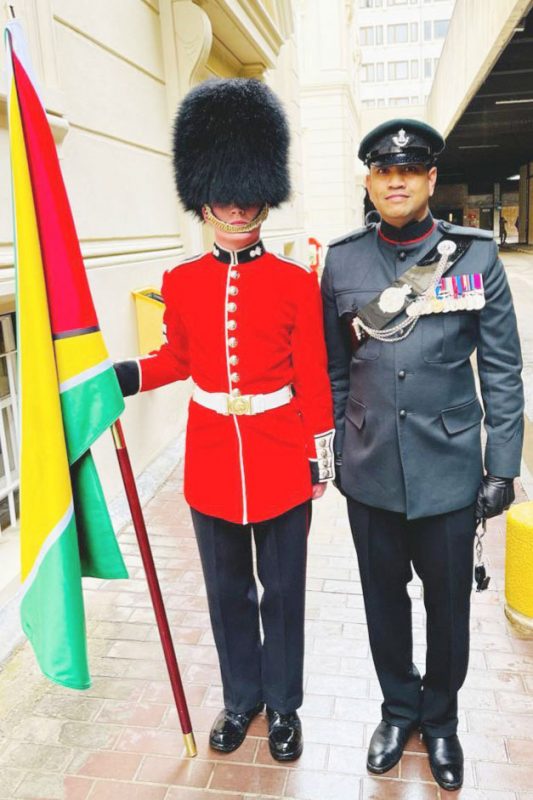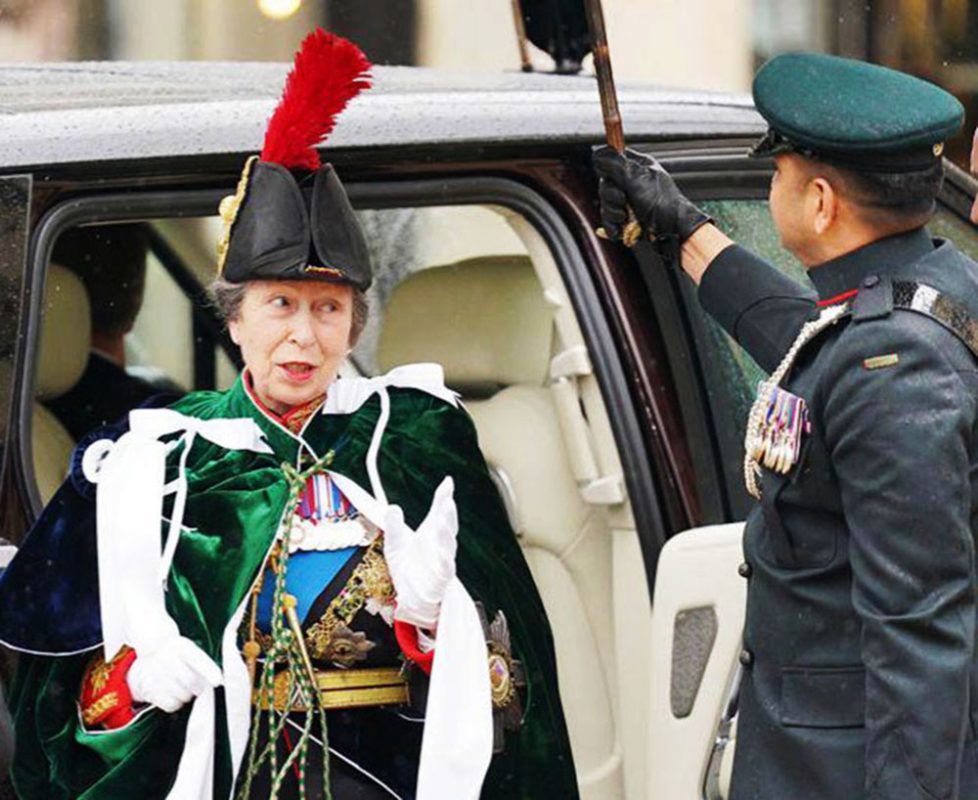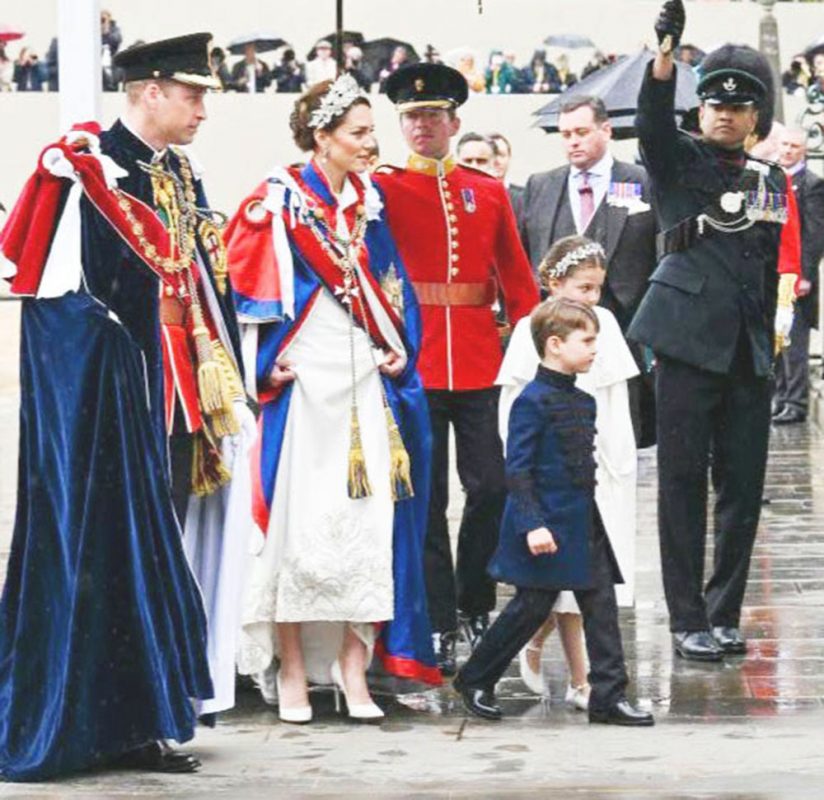Guyana-born Warrant Officer II of the Light Infantry Battalion, Glenrory Low, 46, joined the British Army in 2000 because he was looking for a challenging career, two decades later he least expected to be one of three warrant officers in the army called to serve at the coronation of King Charles III in May last year.
“I was in Northern Ireland on duty with my unit when I got an email in early 2023 informing me I was selected as one of three warrant officers to be part of the coronation activities. That was unexpected. Of course I was delighted. The army has eight battalions – three reserves and five regulars. Out of the whole regiment, they wanted three warrant officers and I was one of those selected as The Rifles of the Queen,” Low told Stabroek Weekend during an interview in Georgetown where he is now on vacation. Another three were requested from the Guard Units of the King.
The request for the warrant officers was made by the Royal Household for the riflemen to be stationed outside of Westminster Abbey where the coronation took place. They were to salute high ranking guests and to help them if they needed any assistance.
As the date of the coronation drew closer, Low thought about the uniform he was going to wear for the historic event.
“I went through my uniforms for formal occasions in my wardrobe and I found they could no longer fit me. I don’t wear those often. I had to get new ones,” he said.
On the day of the coronation, the riflemen took up their station outside Westminster Abbey.
“But then the weather changed and the rain came down. We ended up with umbrellas to escort the VVIPs from the vehicles or their carriages…. The rain did us a favour because that way we got within inches of the members of the Royal Household and the foreign [guests] because we had to hold the umbrellas over them as we escorted them,” he noted. Originally they were meant to be about three to four feet from the guests.
“Look at me taking part in this historical moment. There I was standing, this Guyanese, seeing up close, European royalties, world leaders, Commonwealth representatives and VVIPs and being a part of history all in one event. I couldn’t help reflecting on the opportunities the army gave me – a sense of purpose, pride and achievement,” he added.
Among the many Low vividly recalled escorting or by identifying from photographs taken at the time were Prince William and Princess Kate, Princess Anne, Cherie Blair, President of Tanzania Samia Suluhu Hassan among some others.
“You gave them the space and you stayed behind them because you are not to make yourself prominent. It was hard to remove yourself in such a small space during the rain and while holding the umbrellas,” he said.
During the rehearsals, they were in Buckingham Palace to look at the different carriages so they knew who would provide assistance based on height.
“At the rehearsals, I told myself over and over, ‘Try not to mess this up.’ In the end we pulled it off very well. Our role might have been miniscule in the bigger picture but I was only too happy to be part of the experience,” he said.
While planning for the coronation had begun since the end of the coronation of Queen Elizabeth II, the Rifles were called up at the last minute, Low thinks, because of Queen Camilla’s role as the Colonel-in-Chief of The Rifles, the British Army’s largest Infantry Regiment.
After the early morning parade and marching to their stations the weather changed the order of their day. “Flexibility is the key. Sometimes you can plan for everything but then you could be ambushed left or right and you have to adapt to the environment. So we were prepared for any eventuality,” he stated.
All members of the Royal Family are connected to an infantry battalion or a regiment. On the day of the coronation The Rifles and the Guards were on opposite sides of the arrival area.
The Chief of the General Staff of the army, Sir Patrick Sanders paid The Rifles and The Guards a visit.
Georgetown boy
Low was born in Georgetown and spent his childhood between Norton Street, Queenstown, East Ruimveldt and Alexander Village before migrating to London, England. He attended Ketley Primary and Charlestown Secondary schools from where he recalled a number of teachers like Ms Nurse (social studies), Mr Tyrell, Sir Datadin and Ms Duncan among others.
After leaving school while on his second job in Georgetown, he saw an advertisement recruiting young people to join the British Army.
Why the military? Low said that while he was still a student at Charlestown Secondary preparing for the world of work after writing the Caribbean Secondary Education Certificate examinations, an Officer Duncan (deceased) of the Guyana Defence Force during an outreach gave the students a talk about life in the military.
“His style of leadership, how he engaged us in the community, had an impact on my decision. On reflection at the time, Charlestown did not have enough teachers and resources and it was good to see a different point of view. I would always advise any Guyanese looking for a challenge to join the army. But you have to have a sense of purpose as to why you want to join. Key to success is behaviour and attitude. It is a fulfilling career,” he said
Looking at the British Army’s recruitment ad, Low who was about to join his mother who was living in London said, “It showed the different opportunities available and it provided several career prospects. At the back of my mind was how do I transition from Guyana to England.”
Low applied online while he was still in Guyana and then travelled to England in October 2000.
When Low, in his early 20s arrived in London, his mother wanted him to go to college or university and get a job subsequently.
“I didn’t want to do that. I wanted a more challenging career,” he said.
He had one remaining document to submit. He went to the recruiting office in London which was a long distance from his home and with the deadline for submission due, he made it to the office in time.
He did the required entry tests including an aptitude test and was successful. “They asked me what regiment I wanted to serve in. At that time, I had no idea what the army’s structure was,” he recalled.
Luckily for him, the recruiting sergeant, who was in the Royal Green Jackets, one of two large infantry regiments, had visited the Kaieteur Falls and several places in Guyana in the 1960s.
On meeting Low, they spoke about Guyana. “One of the things about recruiting stations is they tend to poach. If they see someone they like they would say their regiment is the best. I had a good conversation with the sergeant and so I signed up for the Green Jackets on December 16, went through the selection process and passed the fitness test,” he added.
However, he got chicken pox at the army base going through the security checks, biometric tests and physical assessment during the recruitment. “That was over the Christmas period. I was like, ‘What is this? I left Guyana for the UK to get chicken pox,” he mused.
On February 21, 2021, he started training to become a full-fledged rifleman.
Training, tours
In September 2001, he joined his unit in Blackpool, a seaside town on the Irish sea coast of England.
In late October 2001 his unit was sent to Sierra Leone, Africa for three months for international operational military training in force protection.
“This was my first time in Africa, just a year after leaving Guyana. I was like, look at me in Africa. Never in my wildest dreams, I dreamt I would be in that part of the world in a few months after leaving Guyana. These are the opportunities that the British Army would give you to empower yourself,” he stated.
While every officer must know the task of a signaler, Low was a specialised signaler, his first job in the army. He is now an operations warrant officer whose role includes planning, training, preparing the movement of the battalion and receiving orders.
In Sierra Leone he was coding and decoding messages, sending up-to-date reports and requesting supplies.
“At that point in time we had an older radio which was not voice secured. Now we can speak more plainly and also more securely on the radio. It was interesting,” he noted. From that exercise he has formed some friendships in his unit that lasts until today.
“We discuss leadership, our progress, and how we learn as individuals. One of the things we always say is that we are custodians in our positions. So while we are here we should empower people and bring them up to be better at what they do. In that way we get the best out of everyone. Sometimes when we look at people in authority, in the military, it’s not a matter of rank only but of sharing valuable opinions,” he said.
Low has also taken part in military operational exercises in Canada, Belize, Kenya, Romania and France. He successfully completed several challenging tours of duty in several countries including Northern Ireland, Kosovo, Iraq and Afghanistan.
He was stationed in Belfast, Northern Ireland in 2002 after the signing of the Good Friday Agreement which was done in April 1998 and when patrolling the streets was no longer needed. Northern Ireland was an example to him of how communities could be split along religious lines. “I had to understand the complexity of the environment. Coming from Guyana where you might have a cousin who is Hindu, another who is an Anglican, me being a Catholic and we all got along fine. Here I was in Northern Ireland trying to wrap my head around why it was that relatives and family members who were either Protestants or Catholics could not get along. In spite of everything, I like Belfast, the best of its cultural heritage and its food in particular,” he related.
He had two tours of Kosovo in South East Europe. “The first tour was during the height of winter and I experienced cold at a different level. It was minus 32 degrees. We were sleeping in tents and the heating was minimal. We had done 20 something days and we had to stay an extra four days to go to receive our medals of service. I did not like that experience in the cold one bit. As we were finished working and the opportunity was there for us to leave on flights four days before we were due to receive the medals, the entire battle group, over 1,000 people, decided to leave and forego them,” he recalled.
On his second tour to Kosovo, which was done during a summer, he received his medal for the summer tour.
Low did two tours of Iraq with his unit. The first was shortly after the US-led invasion of Iraq in 2003.
“The first tour was quiet. Four of us moved around in a Land Rover supporting massive convoys. On the second tour, we couldn’t go as a group of four. We had to go with a full platoon strength of 30 and in armoured vehicles because insurgency had gone up and we were targeted. We managed to survive that,” he stated.
Asked about feeling threatened, he said, “Every day you leave the base there is a possibility that something can happen. We know we have a job to do. We have faith and trust in each other. We develop a strong bond with each other. It’s like a brotherhood, like family. You have someone checking for mines, and others looking for other irregularities. Communication is key,” he noted.
His three tours of Afghanistan were challenging. “It was a very fluid environment where at any moment anything could change. Within the Afghanistan tours, our regiment lost a few riflemen. Looking back, I try not to think about the negatives,” he said.
In the British Army he met Guyanese in the intelligence corps, medical corps, in logistics and as clerical staff. He also met a Guyanese in Iraq who was in the armoured infantry unit.
Looking forward
February 2024 will mark 23 years since Low joined the British Army. He is due for retirement in February 2025.
“Normally you give 22 years’ service in the British Army. That’s my initial contract but there has been a change in contracts that says we can be in the service for 24 years. If you do the 22 years you have a one-year resettlement period. If you do the 24 years you get a two-year resettlement period. With the two-year resettlement, I will be able to finish my master’s degree.”
Low is the holder of a bachelor’s degree in international studies specialising in international relations and politics which he obtained with honours from the Open University.
He is due to start his master’s degree programme in September.
“Receiving my warrant officer class II rank was definitely a high point for me from when I first joined. I wanted to be a warrant officer before I retired. I started my career journey late. All your friends were progressing. I did my promotional courses. I was lucky to catch up with some who were ahead of me,” he said.
He has moved through the ranks from ordinary rifleman, to lance corporal, corporal, sergeant, colour sergeant to warrant officer class II.
“The highest we go to in the ordinary rank structure is warrant officer class I,” Low said.
Asked what is next for him? Low said, “I try to come home as often as I can. I was here in 2019 with my mom who came home to celebrate her 70th birthday. Then Covid-19 happened and we couldn’t travel.”
So far, he said, he has lived a life of service and he is looking at how he can make a difference by adding value to the society going forward. “I am looking at opportunities here in Guyana,” he said.
